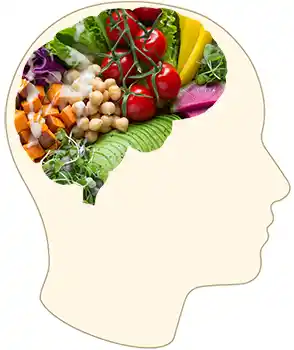Psychiatry | Last Updated: April 25, 2023
Role Of Nutrition In Mental Health: How Diet Can Impact Mood And Brain Function
 Mental health is a crucial aspect of our overall well-being. It impacts how we think, feel, and act, and is essential for living a fulfilling life. However, mental health is a complex and multifaceted issue, influenced by a range of factors, including genetics, environment, and lifestyle choices. One often overlooked factor in mental health is nutrition.
Mental health is a crucial aspect of our overall well-being. It impacts how we think, feel, and act, and is essential for living a fulfilling life. However, mental health is a complex and multifaceted issue, influenced by a range of factors, including genetics, environment, and lifestyle choices. One often overlooked factor in mental health is nutrition.
What we eat plays a significant role in the functioning of our brain and can have a profound impact on our mental well-being. A growing body of research has established a strong link between nutrition and mental health, with studies demonstrating the positive effects of a healthy diet on mood, cognition, and overall mental health.
In this blog post, we will explore the role of nutrition in mental health, with a focus on the link between nutrition and mental health, how nutrition affects depression, the relation between nutrition and behavior, and how nutrition influences human behavior. We will discuss the latest research on this topic, provide examples of foods that can improve mental health, and offer practical tips for incorporating healthy foods into your diet.
By the end of this post, you will have a better understanding of the crucial role that nutrition plays in mental health and the steps you can take to promote better mental well-being through your diet.
The Link Between Nutrition and Mental Health
Nutrition refers to the intake of food and its impact on the body, including how it affects physical health, growth, and development. However, nutrition also plays a critical role in mental health. Research has shown that there is a clear link between the quality of one's diet and their mental well-being.
Studies have demonstrated that individuals who follow a healthy diet are less likely to experience depression, anxiety, and other mental health disorders. A healthy diet is defined as one that includes a variety of nutrient-dense foods, such as fruits, vegetables, whole grains, lean proteins, and healthy fats. These foods provide the body with essential nutrients, such as vitamins, minerals, and omega-3 fatty acids, that are crucial for brain health and function.
On the other hand, diets that are high in processed and refined foods, such as sugary snacks, fast food, and soft drinks, have been linked to an increased risk of depression and anxiety. These types of foods are typically high in calories, saturated fat, and added sugars, and lack the essential nutrients that the body needs for optimal mental health.
Moreover, poor nutrition can also affect cognitive function, memory, and attention. Studies have found that individuals with nutrient deficiencies are more likely to experience cognitive decline and have a higher risk of developing dementia.
Overall, the link between nutrition and mental health is undeniable. Eating a healthy, balanced diet that is rich in essential nutrients can have a profound impact on mental well-being, reducing the risk of mental health disorders and promoting overall mental health.
How Does Nutrition Affect Depression?
Depression is a mental health disorder that affects millions of people worldwide. It is characterized by persistent feelings of sadness, hopelessness, and a loss of interest in activities that one used to enjoy. While depression is a complex condition with multiple contributing factors, research has shown that nutrition can play a significant role in its development and management.
Studies have found that certain foods can help reduce the risk of depression and improve mood. For example, foods that are rich in omega-3 fatty acids, such as fatty fish, flaxseeds, and walnuts, have been shown to have antidepressant effects. Omega-3 fatty acids are essential nutrients that play a crucial role in brain function and development. They can help regulate neurotransmitters, such as serotonin and dopamine, which are key players in mood regulation.
Moreover, a healthy diet that includes a variety of nutrient-dense foods, such as fruits, vegetables, whole grains, and lean proteins, can also help reduce the risk of depression. These foods provide the body with essential vitamins and minerals, such as vitamin D, folate, and magnesium, which are crucial for mental health.
On the other hand, diets that are high in processed and refined foods, such as fast food, sweets, and soft drinks, have been linked to an increased risk of depression. These types of foods are typically low in essential nutrients and high in sugar and unhealthy fats, which can have a negative impact on mood and mental well-being.
Overall, nutrition plays a crucial role in depression. Eating a healthy, balanced diet that is rich in essential nutrients can help reduce the risk of depression and improve overall mental health. On the other hand, diets that are high in processed and unhealthy foods can increase the risk of depression and have a negative impact on mental well-being.
The Relation Between Nutrition and Behavior
Behavioral problems, such as impulsivity, aggression, and hyperactivity, can have a significant impact on mental health and well-being. While these behaviors can have multiple causes, research has shown that nutrition can play a critical role in their development and management.
Studies have found that diets that are high in sugar, refined carbohydrates, and processed foods are associated with increased behavioral problems in children and adults. These types of foods can lead to spikes in blood sugar, which can cause mood swings and irritability. Moreover, diets that are low in essential nutrients, such as vitamins, minerals, and omega-3 fatty acids, can also contribute to behavioral problems.
On the other hand, diets that are rich in whole, nutrient-dense foods, such as fruits, vegetables, whole grains, and lean proteins, can help reduce the risk of behavioral problems. These foods provide the body with essential nutrients, such as magnesium, zinc, and vitamin B6, which are crucial for brain function and development. Moreover, diets that are rich in omega-3 fatty acids, such as fatty fish, flaxseeds, and walnuts, have been shown to reduce aggressive and impulsive behavior.
Furthermore, research has shown that certain food additives, such as artificial colors and preservatives, can also contribute to behavioral problems, especially in children. Eliminating these additives from the diet has been shown to improve behavior in some children with ADHD.
Overall, nutrition plays a critical role in behavior. Eating a healthy, balanced diet that is rich in essential nutrients and free from additives and processed foods can help reduce the risk of behavioral problems and promote overall mental health and well-being.
How Does Nutrition Influence Human Behavior?
The impact of nutrition on human behavior is substantial. Food provides essential nutrients that are crucial for brain function and development, and can affect the production and regulation of neurotransmitters, such as serotonin and dopamine, which are important for mood regulation and behavior.
Studies have revealed that diets high in sugar, refined carbohydrates, and processed foods can result in mood swings, irritability, and behavioral issues. These foods cause spikes in blood sugar that can disrupt neurotransmitter production and regulation, leading to changes in mood and behavior.
On the other hand, diets rich in whole, nutrient-dense foods like fruits, vegetables, whole grains, and lean proteins can promote positive behavior and mood by providing essential nutrients such as vitamins, minerals, and omega-3 fatty acids that are critical for brain function and development.
In addition, specific nutrients have been shown to have effects on behavior. For instance, omega-3 fatty acids have been found to decrease aggression and impulsivity, while a deficiency in vitamin D has been linked to depression and mood disorders.
Moreover, research has revealed that the gut-brain axis, which is the communication pathway between the gut and the brain, plays a crucial role in regulating behavior and mood. The gut microbiome, a collection of microorganisms that reside in the gut, can affect neurotransmitter production and regulation, such as serotonin, which can have an impact on behavior and mood.
Overall, nutrition plays an important role in human behavior. A balanced diet that is full of essential nutrients and devoid of processed foods and excessive sugar can improve mental health and well-being by promoting positive behavior and mood.
Conclusion
Ongoing research is investigating the relationship between nutrition and mental health. While current studies indicate that our food choices could potentially affect our mental well-being, this is a complex and perplexing field that requires further exploration.
It is crucial to remember that diet is just one component of the broader topic of mental health. Therefore, individuals experiencing depression or anxiety symptoms or having general concerns about their mental well-being should collaborate with a reliable healthcare provider to create a tailored treatment plan.






